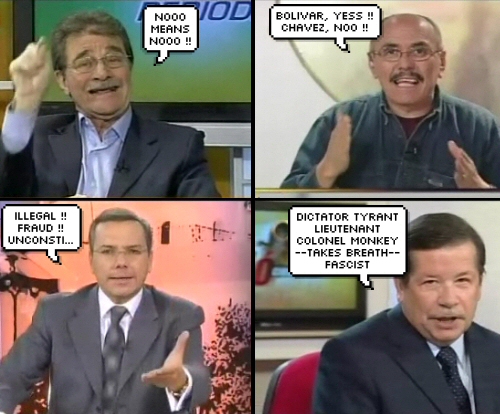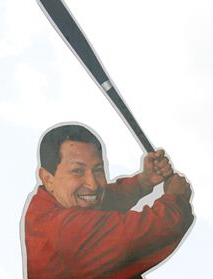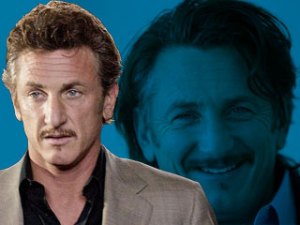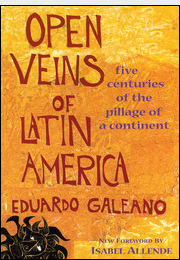
Archive for the ‘Uncategorized’ Category
HAPPY CHAVISTMAS, ONE AND ALL
Posted in Uncategorized on December 23, 2008| Leave a Comment »
TRANQUILO, TRANQUILO…
Posted in Uncategorized on December 10, 2008| 2 Comments »
If the ‘Si’ campaign wins, the constitution is amended, Chavez is nominated in 2012 and remains president until 2019…

…the referendum, the vote, the PSUV primary and the general election will ALL have been the wish, will, decision and desire of the Venezuelan people.
FEARING DEMOLITION OF THE VENEZUELAN STATE
Posted in Uncategorized on December 9, 2008| 1 Comment »
 Jeremy Morgan has been in the journalism game for quite a while. He can churn out good copy faster than anybody, and has a knack of writing straight up, in-your-face articles. As a Daily Journal (of Caracas) scribe, he’s consistently reported Venezuelan politics even as younger colleagues were busy recovering from too many Cuba Libres the night before. Nowadays, he’s also a senior correspondent for the Herald Tribune.
Jeremy Morgan has been in the journalism game for quite a while. He can churn out good copy faster than anybody, and has a knack of writing straight up, in-your-face articles. As a Daily Journal (of Caracas) scribe, he’s consistently reported Venezuelan politics even as younger colleagues were busy recovering from too many Cuba Libres the night before. Nowadays, he’s also a senior correspondent for the Herald Tribune.
In major private news organisations, writers either know too much and “play the game like a violin” or, like the vast majority, honestly believe what they say. As Chomsky said famously to a witless Andrew Marr, “I don’t say you’re self-censoring — I’m sure you believe everything you’re saying; but what I’m saying is, if you believed something different, you wouldn’t be sitting where you’re sitting.”
Jeremy Morgan has both feet in the opposition camp in these critical stages of the revolution. And like so many others in the same position, his analysis of developments in Venezuela is understandably consumed with cynicism. As we’re about to see, nothing that he says is untrue (as far as I can tell). But what is missed entirely is the true purpose, or raison d’être, of that which is unfolding before his admirably critical eyes.
Chavez desires to demolish the present state structure, but the crucial question is whether his ultimate intention is to more supremely dictate Venezuela’s affairs or construct an entirely fresh system of participatory democracy. The obvious counter-point to the first suggestion is that Chavez to a large extent already has massive power. He can nationalize what he likes, and looks set to win a forthcoming referendum on whether he can be reelected indefinitely. Why go to such great lengths, attempting to overturn the entire political order, when the world is already at your feet?
Governors and mayors as they exist today are remnants of the old order, and by virtue of their form and functions, can never be truly accountable or serve the true will of the building blocks of the new society. That means Chavez first has to designate new, logical boundaries (corresponding to real geographic, economic and cultural differences), and then implement a new chain of governance in which power flows up, instead of down.
Take a recent comment by Chomsky on Obama’s victorious campaign, to emphasise the point:
I mean, Obama did organize a large number of people and many enthusiastic people in what’s called in the press, Obama’s Army. But the army is supposed to take instructions, not to implement, introduce, develop programs and call on its own candidate to implement them. That’s critical.
Venezuelan citizens, primarily via the newly established communal councils and other instruments of popular power, will hopefully be developing, introducing and implementing their own programs and ideas before long. But allow Jeremy Morgan to explain what is really happening:
Talk in the corridors at the National Assembly is of a introducing a barrage of legislation giving the federal government more sway over what people further down the chain of command can and cannot do. The thrust of this, it’s said, is that state governments and municipal authorities would be subject to more direct control from the Executive. The plan is part and parcel of Chávez’ plan to change the political structure of the country by dividing Venezuela into five or six large territories controlled by regional overlords directly appointed by him.
Despite a small contradiction between what “is said” and what is definitely “part and parcel”, we can see the “thrust” of Morgan’s argument. Of course, nowhere are the communal councils (or any element of growing local power) mentioned, leaving the reader to assume that everything is happening above, and nothing below. It’s clear that real democracy in Venezuela will never appear without action from above — that is the point of taking power, as far as many revolutionaries are concerned. But to ignore the rapid formation and encouragement of real grassroots power is to fool the reader into thinking that such a purpose is off the table.
Morgan continues:
Bright eyes have spotted what they see as the first step down this road tucked away in, of all places, the Budget Bill for 2009 as it trundles through parliament. The text includes a reference to obliging state institutions to “build solid structures for the establishment of the new territorial vision.” Mindful of constitutional niceties, officials intend to use existing laws and state organizations to push through this far-reaching change. For a start, they’ve got their eye on the Special Economic Assignations Law (LAEE), which usually gets shunted through Parliament in tandem with the budget.
They’re also said to fixed their gaze on, of all things in this particular context, the Inter-Governmental Fund for Decentralization (Fides) as the vehicle for wrenching Venezuela from the pattern of the past and resetting it under Chávez’ New Order.
The article can be read in full here. More analysis is possible, but let it suffice to say: Mr. Morgan can’t seem to see the wood for the trees, or if the other half of the possible big picture is indeed apparent to him, we’re none the wiser.
SEAN PENN ARTICLE: A FEW SNIPPETS
Posted in Uncategorized on December 7, 2008| Leave a Comment »
 This guy can write! 17,632 words is asking a bit much for the time-pressed individual, so here are the bits you don’t want to miss.
This guy can write! 17,632 words is asking a bit much for the time-pressed individual, so here are the bits you don’t want to miss.
Taking the drug war seriously:
Uninterestingly, they turned out to be a couple of gents, South African though they were. In practice, their job in Venezuela was logistical. One, organized the patrolling of waterways by their company, contracted by the Venezuelan government to aid in drug interdiction. The other strategized jungle patrols on the Colombian border. We talked about a lot of things, and a lot of parts of the world, as I tend to do when indulging Johnny Walker Black. But here are the highlights: Neither one of them liked Chavez a bit. Whatever personal politics they might have had were far to the right of my peripheral vision. Chavez just wasn’t their kind of fellow. But the jungle patrolled said straight out, “I’ll tell you this about Chavez though. Of all the countries we’ve worked for, this government is by far, the most serious about drug interdiction.” I said, “What’s the bad news?” He said, “Chavez won’t last a year.” “What do you mean?” I said. “He’s too radical. We’ve seen it before.” “Seen what before? I said. “They’ll kill him.” “They?” I said. He reached across the table, took a sip of my Johnny Walker Black, smiled, and pointed directly at me, the Americano at the table.
Expecting the global financial crisis:
Covering the trip for the New York Times, Simon Romero, later reported Chavez’s post-flight prediction of a U.S. financial crisis, “that could cause it to explode from within.” This was August 3rd, 2006.
Environmental justice:
We arrived in the mountaintop town of Pueblo Encima as Chavez mounts a platform before a waiting crowd of Cipriano Castro lab personnel. This new facility, he was here to inaugurate, was developing organic pesticides. Prior to the advent of this technology, rain and irrigation waters polluted with toxic synthetic pesticides, worked their way through the tributaries down mountain throughout all of the villages where we had stopped on the road. As a result, cancer rates had escalated to genocidal proportions. Declaring the beginning of a new era of organic pesticides and celebrating the completion of the Cipriano Castro laboratory, Chavez declared, “We now stand at a vista of hope, where what before had been merely…a mountain of snakes.”
14 years of secret Cuba-U.S. dialogue:
He paused, now slowly considering a thought. “I’ll tell you something, and I’ve never said it publicly before. It had been leaked, at some point, by someone in the U.S. State Department, but was quickly hushed in concern of the Florida electorate, though now, as I tell you this, the Pentagon will think me indiscreet.” I wait with bated breath. “We’ve had permanent contact with the U.S. military, by secret agreement since 1994. It is based on the premise that we would discuss issues only related to Guantanamo. On February 17th, 1993, following a request by the United States to discuss issues related to buoy locators for ship navigations into the Bay, was the first contact in the history of the revolution. Between March 4th and July 1st, the Rafters Crisis took place. A military-to-military hot line was established, and on May 9th, 1995, we agreed to monthly meetings with primaries from both governments. To this day, there have been 157 meetings, and there is a taped record of every meeting. The meetings are conducted on the third Friday of every month. We alternate locations between the American base at Guantanamo, and in Cuban-held territory. We conduct joint emergency-response exercises. For example, we set a fire, American helicopters bring water from the bay, in concert with Cuban helicopters. The American base at Guantanamo had created chaos. We had lost border guards, and have graphic evidence of it. The wet-foot/dry-foot policy of the U.S. had encouraged illegal, and dangerous emigration. And had U.S. coastguard ships intercepting Cubans who tried to leave the island. They would bring them to Guantanamo and a minimal cooperation began. But, we would no longer play guard to our coast. If someone wanted to leave, we said, go ahead. And so, with the navigation issues, came the beginning of this collaboration. Now, also, at the Friday meetings, is always a representative of the U.S. State Department.” No name given. He continues, “The State Department tends to be less reasonable than the Pentagon. But no one raises their voice because…I don’t take part. Because I talk loud. It is the only place in the world where these two militaries meet in peace.” “What about Guantanamo,” I ask. “I’ll tell you the truth,” Castro says. “The base is our hostage. As a president, I say, the U.S. should go. As a military man, I say, let them stay.”
NO NEED FOR SIGNATURES: A VOTE IS A VOTE
Posted in Uncategorized on December 6, 2008| Leave a Comment »
 The PSUV today decided to have the National Assembly, and not 15%+ of the electorate, propose removing presidential term limits. I can’t say I’m upset with this. Why expend massive amounts of time, money and effort to collect 2.5m signatures when a simple alternative is available?
The PSUV today decided to have the National Assembly, and not 15%+ of the electorate, propose removing presidential term limits. I can’t say I’m upset with this. Why expend massive amounts of time, money and effort to collect 2.5m signatures when a simple alternative is available?
It isn’t ideal, because everybody wanted this crucial amendment to be totally “popular” from start to finish. But seeing as the opposition would have claimed it to be Chavez’s own proposal whatever happened, there’s nothing to be lost (except perhaps a handful of votes, at worst).
(Apparently there’ll be a token signature collection to give the NA the “force of the people”. Unless they get some serious numbers, this ‘gesture’ will only be cannon fodder for Globovision. But fine, whatever.)
This means it’s going ahead with the absolute minimum of delay. So, less of a window for the oppos to flood the airwaves with — as Chavez nicely put it — debate about “if he’s a tyrant, or not a tyrant, or half a tyrant“.
SO MR. CHAVEZ, WHAT’S THE RUSH?
Posted in Uncategorized on December 5, 2008| 7 Comments »
 To reply to Tosh’s most recent comment, I decided to write a new post. Basically, I had to pull yesterday’s post on the same topic because I made a couple of schoolboy errors.
To reply to Tosh’s most recent comment, I decided to write a new post. Basically, I had to pull yesterday’s post on the same topic because I made a couple of schoolboy errors.
Here’s the jist of his argument:
Carlos, I gotta tell ya, I just don’t agree with doing this amendment right now. What is the point of doing this right now? What is the hurry? Aren’t there more important things to be focusing on right now?
But doing it right now just seems like a desperate move. It looks like Chavez wants to take advantage of the relatively high support he got in the regional elections to ram this thing through before he loses more popularity. Is he afraid he won’t have enough popularity to win this thing a few years down the road?
Firstly, if this is all over within 3 months, the more important things can wait patiently, in my opinion. But questions like the ones highlighted above need to be answered.
Arturo and myself think a lot has to do with momentum, and there’s two sides to that. #1, Everybody is still in “election mode”, and the PSUV machinery does not have to be reactivated from a standstill. #2, The opposition, despite losing overall on the 23rd, are gaining confidence fast, and need to be “depressed” as soon as possible.
If we wait until 2010 or 2011, the opposition will have participated in another one or two votes and come away thinking they “won” again in each case. It’s all psychological, because they have nothing to lose (especially in terms of the National Assembly!). On the other hand, winning this vote will deal a massive psychological blow.
Massive.
I’m honestly not tempted to believe Chavez’s popularity is dipping. No numbers are available to demonstrate, or even suggest it. And neither do I believe Venezuela’s economy is in any serious trouble. I think more than ever, we have to trust the guy with all the information and his finger on the pulse of the nation. Think about it: he presumably has full access to the CNE database, and can see the exact number of people who consistently vote for him, joined the PSUV, and everything else.
As a military man, he understands the value of keeping the “enemy” in the defensive half. This must be a calculated move.






